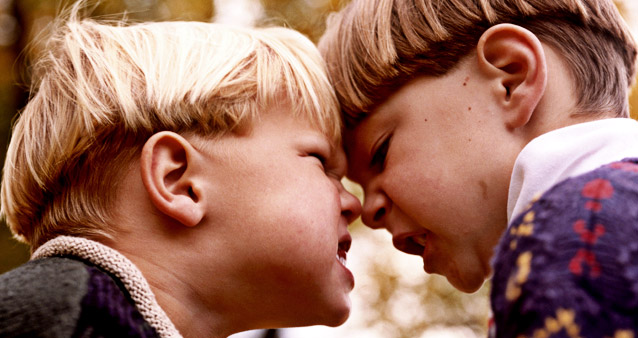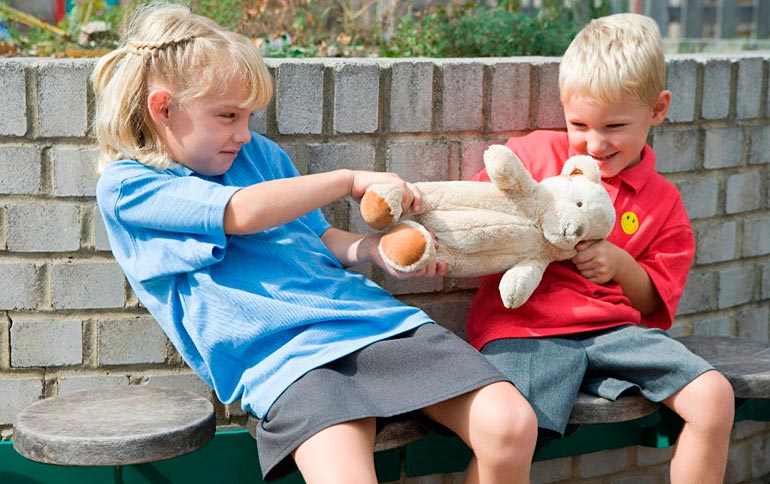Recently, I had a conversation with one friend, whose child first went to kindergarten. I asked her how the first day went. She answered with undisguised joy that everything was fine: “In the morning I brought Nikita into a group, dressed him, left him without problems. I come in 2 hours, standing in the same place where I left him. "
Obviously, Nikita belongs to the category of timid and calm kids. He stood waiting for his mother in one place for about 2 hours without tears, without tantrums, without unnecessary movements.
During walks, we sometimes meet with Nikita and his mother on the street, the children play in the sandbox together. So, my son Artem freely picks up his favorite toys from Nikita and tells him where to build a sand castle. And if it were another child, wayward and fervent, who would not allow such an attitude, a quarrel would not have been possible.
A similar incident has already occurred with us on the playground. My Artem collided with his “same foreheads” with the same cocky kid, as a result of which there was a serious fight with attempts to finish off an opponent. Something like us, two mothers, stopped our raging "warriors". At that moment, I decided that I would no longer lead my son to play on that site, and also try to explain to him that the desired can be achieved without a fight. My thoughts on whether I was right made me pretty nervous.What to do right in such situations?

Kids are fighting
Let's get started with reasons fights between children. Where do the roots of child aggression come from and why do babies allow themselves such behavior? Psychologists believe that there are only 6 such reasons.
- Lack of parental attention
The explanation here is quite simple. The kid knows that at the time of the fight, mom will immediately come running, abandoning all her affairs, and begin to figure out what happened and who is to blame. Such behavior is characteristic of children in whose families replenishment took place not so long ago. The child is afraid to lose the love that he is used to, he is terribly jealous of the newborn, worries, so subconsciously does not come up with anything better than to arrange a fight. (read on the topic: sibling rivalry)
- Inability to communicate differently
Not all kids know how to express their thoughts and desires in words, so sometimes they have to resort to physical action. Don't let this scare you. It often happens that by pulling each other's hair or bobbing shoulders, the kids will very soon continue to play peacefully. Over time, it’s still worthwhile to teach such brawlers to explain in the normal way.
- Protecting Your Interests
When parents perceive their child as a person, they have no questions why the baby is fighting because of his toy. It is his right to protect his belongings from any encroachment on them and dispose of them at his discretion.Therefore, when the words: “Give back my toy!” do not have the desired effect, fists are already being launched.

- A way to get rid of excessive parental care
Continuous monitoring sometimes tires kids. It is difficult to stay on top all the time and correspond to my mother’s ideas about the ideal child. The accumulated stress makes itself felt, and the baby becomes like a wolf cub driven into a corner. Try to “loosen your grip”, give your child a little freedom and trust. Then the fights can be completely forgotten.
- Excessive activity is a consequence of hot temperament
Even adults, psychotype choleric, can not always cope with themselves and pacify their ardor. What then to say about little children? It is very difficult to control yourself at the time of a stormy showdown, which is why temperamental babies prove their "truth" on their fists.
- Health problems
Hyperactivity, distracted attention syndrome and increased excitability are indicative of impaired child health. If the mother was stressed during pregnancy or the birth was not entirely successful, some similar behavioral features may be observed in children. They can not be attributed to bad manners or rampant. Any of your suspicions of such violations must be expressed to a neurologist.
We also read: If the child is not friends with anyone: the fight against child loneliness
What should parents do when their children fight?
Point of view No. 1. Do not climb - let them understand themselves
“Do not get stuck in their relationship. How will they cope with their problems in the garden, school? Mom will not be around! ”
Basically, yes, when we talk about children over 4 years old. But what about the kids 2-3 years old? Really let them smash everything to pieces when they share a place in the sandbox or decide who will play with the rubber donkey?Most children are ready to fight to the end to get what they want..
Each kid is absolutely convinced that the toy should go to him, so the fight usually lasts until all the sand in the sandbox is behind its side, and the donkey does not lose its ears forever. Adult intervention in this situation is imperative. Such little children still do not know how to negotiate, they need help.Teach them to negotiate - this will be the key to the successful development of their personality.
Point of view No. 2. Distract attention to something else
When your child is furious and does not hear anything around, the only way out is to change the situation. Grab it under your arm and take the skirmishes off. He will be able to understand what you are telling him only if he calms down. Be patient, don't let your anger get the better of emotions.
We were all children and we understand that we can’t do without quarrels in communicating with other people. Kids at this age still do not understand much and therefore solve their issues in ways that are accessible to them.Do not swear, try to understand their feelings and help to cope with them.
Point of view No. 3. Show how fun to play together
The most difficult task is to explain to your child that you can play with the one you are angry with. "How do you not understand that you can’t fight!" or “Try to find a common language with Kolya. Give her your toy, and he will let you play your ball ”- such your arguments will most likely be received with hostility.Parents need to show kids how to play together.
Interest the children in some kind of game, for example, start playing ball together. You can throw it to each other in turn, in a circle.Children enjoy adult participation in their games.. Try to come up with an interesting lesson for them, then there will be less and less reason to argue or fight for the next toy.
Trying to explain something to a strange child is not a thankful task at all. Most likely, you will not get anything from him, in addition, you risk being misunderstood by his parents. And this can lead to scandal, as a result of which you may lose your authority in the eyes of your child.Be reasonable and always put yourself in the shoes of other parents. Would you like it if someone reads your child’s notations? I think no.
My “helpers”
My practice of communicating with children taught me how to resolve conflicts in some fairly primitive ways.In my purse there will always be small toys like soap bubbles, colored crayons or inflatable balloons. These are the very things that can distract children from conflict and take their attention.
We, adults, do not always know how to cope with our emotions, and, sometimes, get involved in a quarrel. All our lives we learn to find a compromise, but not always we succeed. It is only a pity that our conflicts cannot be dispelled with the help of a few pieces of colored chalk or a couple of beautiful balloons.
READ ALSO: Conflicts on the playground: how not to bring to a fight?
There is nothing more difficult for a mother than situations when one child offends another. I want to teach a lesson, punish the offender, show how it hurts. Is it effective? Will such methods guarantee that fights will not be repeated in the future? In the issue of “Women's Environment”, Yana Kataeva gives you working tips. All that remains for you is to have a little patience and put these tips into practice:









It doesn’t matter if your child is 2 years old or 6 years old, in order to discourage the fight, friendly family atmosphere and quiet conversations will help. Add more kisses, hugs and warm words!
A familiar situation, my son is also like that. Greets passersby, many smile and greet him too. And some look so that I myself feel uneasy. And on the playground, there are such wild children. My is upset and asks why so. And what should I answer. The ball is even a case like this, after the conflict on the site, I began to sleep poorly. Gave tea with mint, baby formula bears calm. I talked, told, all right, and we don’t go to that site anymore.